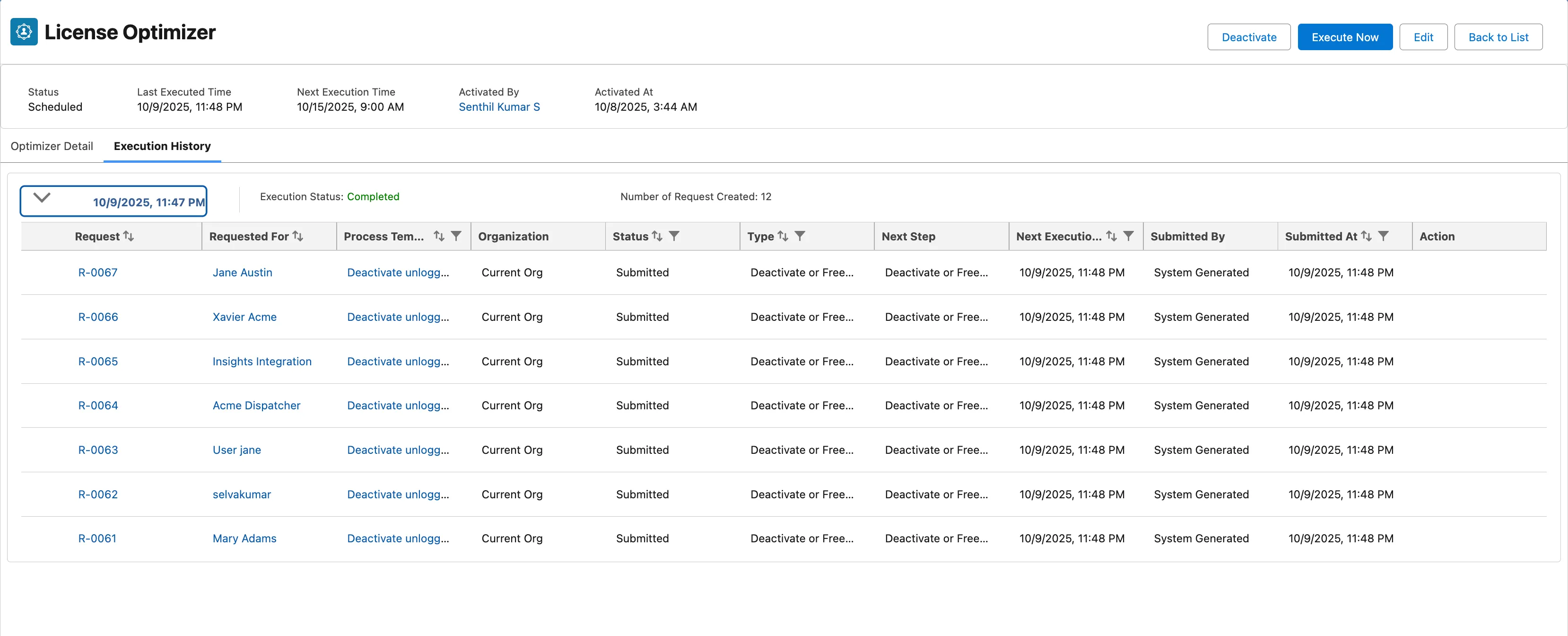Stop Wasting Salesforce Licenses
.svg)
.svg)
Table of Contents
Meet Mark, a Salesforce Admin
Mark runs Salesforce for a mid-sized company with nearly 1,500 employees. Every quarter, turnover means dozens of accounts should be deactivated — but Mark is still chasing them manually. His routine looks familiar to many admins:
- Export login history reports.
- Compare them against HR exit lists.
- Email managers for confirmation.
- Deactivate users one by one and free up licenses.
By the time Mark finishes, another set of accounts has already slipped through the cracks. And worse — finance notices the company is paying for licenses no one is using.
The Cost of Manual License Management
Manual cleanup brings three big headaches:
- Silent waste → Unused licenses quietly burn budget.
- Admin burnout → Hours lost to repetitive checks and approvals.
- Gaps in accuracy → Users linger active far too long, exposing compliance risks.
License Optimization with User 360
For admins like Mark, the License Optimizer transforms cleanup from a dreaded chore into a scheduled, repeatable process:
- Select a Template
Mark begins by choosing the process template that defines the actions to take — for example, Deactivate User, Freeze User, or Remove Licenses.
- Run the Optimizer
He can choose to Run Now for immediate execution or Submit to let the Optimizer create requests for the next scheduled run.
- Requests Are Created and Handled
Once submitted, requests are automatically generated for each inactive user found. From here, it’s all handled — no more spreadsheets or manual deactivation.

Why This Is Easier for Mark
With the Optimizer, Mark doesn’t spend hours piecing together reports or chasing approvals. The process is: select a template, run or submit it, and let requests handle the rest.
- Consistent license cleanup: Every inactive user is treated the same way, based on the rules already defined.
- Scales easily: It works whether one user is flagged or an entire group is inactive.
- No repetitive effort: Once the template is in place, Mark doesn’t have to rebuild the process — he can run it again or let the schedule take over.
- Always visible: Each request is logged, so there’s proof of what happened and no hidden actions.
The waste, fatigue, and errors of manual cleanup simply don’t come into play anymore — freeing Mark to focus on real admin work.
How License Optimizer Works Behind the Scenes
Behind Mark’s simple run, User 360 manages the setup and automation:
- Process Template as the Foundation
The template defines the action to be applied — deactivate, freeze, or remove licenses. Templates with Create User or Clone User aren’t supported here.
- Filters Define Who Qualifies
Conditions like Last Login > 90 days or Profile = Sales are set to determine which users the Optimizer will act on.
- Schedule and Execution
- If Run Now is chosen, the request is executed immediately.
- If the template is scheduled (every 15/30 days, for example), requests are created at that interval and executed according to the template’s timing.
.webp)

- Requests and Batch Handling
When the Optimizer finds matching users, it generates a separate request for each one. These requests don’t just sit idle — they’re picked up by a background batch that runs every hour. The batch ensures actions (like deactivation or license removal) are carried out consistently without Mark needing to manually trigger anything.
- Track and Control Requests
All generated requests are grouped in a dedicated list view inside User 360. From here, admins can monitor progress, step in to recall or cancel before the batch executes and keep everything under control. This visibility means nothing runs without oversight, even though it’s fully automated.
- Logs for Investigation
Each request carries a detailed log. If actions succeed, Mark sees confirmation; if something fails, he can investigate what went wrong without guesswork.
This structure keeps automation precise and accountable: templates define the rules, filters define the targets, and requests keep execution transparent.
Take Control of Your Licenses
License waste doesn’t have to be a hidden cost in your Salesforce org. With User 360, cleanup is automatic, trackable, and always under admin control.
👉 Ready to reclaim unused licenses and simplify user management? Explore User 360 today.





